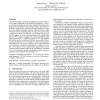Free Online Productivity Tools
i2Speak
i2Symbol
i2OCR
iTex2Img
iWeb2Print
iWeb2Shot
i2Type
iPdf2Split
iPdf2Merge
i2Bopomofo
i2Arabic
i2Style
i2Image
i2PDF
iLatex2Rtf
Sci2ools
138
Voted
PPOPP
2009
ACM
2009
ACM
Mapping parallelism to multi-cores: a machine learning based approach
The efficient mapping of program parallelism to multi-core processors is highly dependent on the underlying architecture. This paper proposes a portable and automatic compiler-based approach to mapping such parallelism using machine learning. It develops two predictors: a data sensitive and a data insensitive predictor to select the best mapping for parallel programs. They predict the number of threads and the scheduling policy for any given program using a model learnt off-line. By using low-cost profiling runs, they predict the mapping for a new unseen program across multiple input data sets. We evaluate our approach by selecting parallelism mapping configurations for OpenMP programs on two representative but different multi-core platforms (the Intel Xeon and the Cell processors). Performance of our technique is stable across programs and architectures. On average, it delivers above 96% performance of the maximum available on both platforms. It achieve, on average, a 37% (up to 17.5...
OpenMP Runtime Default | Parallel Computing | Parallelism Mapping Configurations | Performance Keywords Compiler | PPOPP 2009 |
Related Content
| Added | 25 Nov 2009 |
| Updated | 25 Nov 2009 |
| Type | Conference |
| Year | 2009 |
| Where | PPOPP |
| Authors | Zheng Wang, Michael F. P. O'Boyle |
Comments (0)

